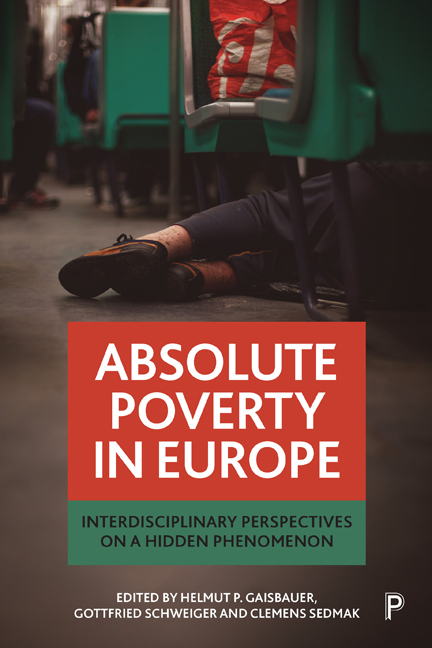Book contents
- Frontmatter
- Contents
- List of figures and tables
- Notes on contributors
- 1 Absolute poverty in Europe: introduction
- Part One Conceptual and methodological challenges
- Part Two Key issues for the absolute poor
- Part Three Policy responses to absolute poverty in Europe
- Part Four Ethical perspectives on absolute poverty in Europe
- Conclusion responding to the dark reality of absolute poverty in European welfare states
- Index
10 - Unravelling the complexities of poverty in Northern Ireland, a new immigration destination
Published online by Cambridge University Press: 27 April 2022
- Frontmatter
- Contents
- List of figures and tables
- Notes on contributors
- 1 Absolute poverty in Europe: introduction
- Part One Conceptual and methodological challenges
- Part Two Key issues for the absolute poor
- Part Three Policy responses to absolute poverty in Europe
- Part Four Ethical perspectives on absolute poverty in Europe
- Conclusion responding to the dark reality of absolute poverty in European welfare states
- Index
Summary
Introduction
Her husband works in a car wash for example and he earns about £25 each day and their rent is £600 per month. She does cleaning here in the building and gets £5 per hour. She only has a few hours cleaning and that is how they earn money … There are other members of her family living in the same house and sharing the rent, otherwise they would not be able to afford it. Between transport and lunches, etc, the lady feels that she has to provide at least £5 each day so that her child feels the same as the other children.
[I]f someone missed a day, sometimes he would be fired, this would never have happened to a local person … if people came late, the supervisors were shouting at the Polish people … sometimes there were nightmares where supervisors would bully people to make them give up work and they wouldn't have to fire them … like standing in front of them and telling them they should work faster, faster, faster … they would try and find any flaw possible … and all of this to get them to leave the job.
The first quote from a support worker for the Roma community in Northern Ireland very aptly illustrates the complexity of poverty facing many migrants today. It shows how migrants not only juggle basic income on a daily basis, for which they have to work long and hard, but they are compelled to live in overcrowded housing and they are constantly switching frames of reference between their country of origin and the host society. In the second quote, a Polish worker earning a basic income describes unequal treatment and violation of self-respect and dignity. These migrant stories are set in Northern Ireland, a place that has until relatively recently experienced emigration. As a new immigration destination (NID), it presents an ideal setting to understand challenges as they unfold. This chapter will look further into these issues by exploring what poverty means, providing an overview of NIDs, before moving on to show how poverty can cause anxiety, indignity and insecurity for the individuals involved and how it is understood across national boundaries.
- Type
- Chapter
- Information
- Absolute Poverty in EuropeInterdisciplinary Perspectives on a Hidden Phenomenon, pp. 211 - 228Publisher: Bristol University PressPrint publication year: 2019



